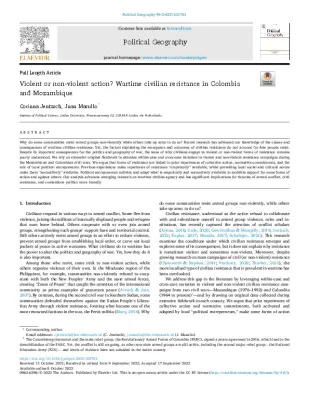Why do some communities resist armed groups non-violently while others take up arms to do so? Recent research has advanced our knowledge of the causes and consequences of wartime civilian resistance. Yet, the factors explaining the emergence and outcomes of civilian resistance do not account for how people resist. Despite its important consequences for the politics and geography of war, the issue of why civilians engage in violent or non-violent forms of resistance remains poorly understood. We rely on extensive original fieldwork to examine within-case and cross-case variation in violent and non-violent resistance campaigns during the Mozambican and Colombian civil wars. We argue that forms of resistance are linked to prior experiences of collective action, normative commitments, and the role of local political entrepreneurs. Previous experiences make repertoires of resistance “empirically” available, while prevailing local social and cultural norms make them “normatively” available. Political entrepreneurs activate and adapt what is empirically and normatively available to mobilize support for some forms of action and against others. Our analysis advances emerging research on wartime civilian agency and has significant implications for theories of armed conflict, civil resistance, and contentious politics more broadly.
Publisher(s)
Publication year
2022
Abstract
ACCESS
File
Document
RS1011_j.polgeo.2022.pdf
(585.25 KB)
Access
“Open” means that the resource is available to view, but please check the weblink for restrictions on use. “Restricted” means that the resource is not openly accessible to all, but you can purchase a copy, or your organisation might have an institutional subscription.
Source
Political Geography, Volume 99, 2022, 102761, ISSN 0962-6298, https://doi.org/10.1016/j.polgeo.2022.102761.
(https://www.sciencedirect.com/science/article/pii/S0962629822001755)
FURTHER INFORMATION
Source type
Keywords
Country
Language(s)
